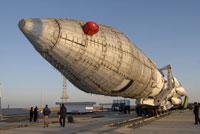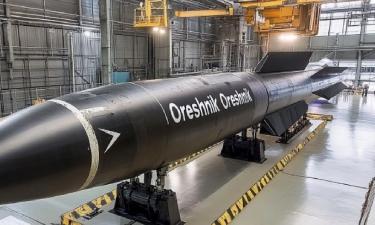Kazakhstan Blackmails Russia for Proton-M Booster Launches
Russia’s Space Corporation Roskosmos had to delay to the launch of Proton-M booster rocket with Eutelsat-W7 European satellite on board. The rocket was supposed to blast off from the Baikonur Spaceport in Kazakhstan. However, the launch has been delayed indefinitely after the Kazakh authorities did not give their permission for it.

An official statement released by Roskosmos said that the launch of the W7 spacecraft of Eutelsat had been canceled for reasons, which Russia was not accountable for. The satellite should have been launched from Kazakhstan’s Baikonur on Monday, November 23, at 5:19 p.m. Moscow time. All the works related to the scheduled launch had been completed and coordinated with Kazakhstan’s Space Agency (Kazkosmos).
Alexander Vorobyov, an official with Roskosmos, said that the launch had been originally delayed for one day. “Probably, it can be delayed again, which may affect the equipment,” the official said.
Alexander Zheleznyakov, an official with the Russian Academy for Cosmonautics, said that the launch might have been canceled after the sides failed to coordinate the landing areas for Proton’s stages. Roskosmos officials said, though, that all details of the launch had been coordinated entirely.
Russian experts believe that the scandal might have occurred because of the rent conditions. Launching a booster rocket in space is evaluated at approximately $25 million. In addition, Russia and Kazakhstan have a special lease agreement for Baikonur Spaceport. The agreement, ratified by the governments of the two countries, stipulates that Kazakhstan shall not hinder the activities of the renter either expressly or by implication.
Russia has already paid the rent of $1.265 billion to Kazakhstan since 1998, when the agreement was signed.
Kazakhstan ’s decision to cancel the launch can probably be related to ecological reasons, bfm.ru website said. One of the previous launched of Russia’s Proton-M booster with a Japanese spacecraft on board – the launch took place in September 2007 – ended with a breakdown. The fragments of the rocket landed in the uninhabited area, about 50 km far from the nearest settlement. Kazakhstan’s EMERCOM officials said after the accident that the content of the toxic fuel – heptyl – on the crash site exceeded the norm some 5,200 times. Russia had to pay a $2.5-million-dollar compensation to Kazakhstan, although the Asian nation was asking for $60.7 million. Afterwards, the Kazakh authorities said that they would probably decide to halve the number of Proton-M launches in 2008.
Nevertheless, Kazakhstan may use the danger of the ecological disaster as a pretext to raise the amounts of risk insurance, which Russia will need to pay.
BFM.ru
Subscribe to Pravda.Ru Telegram channel, Facebook, RSS!


